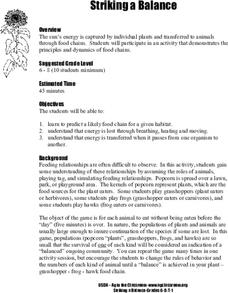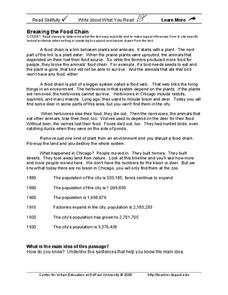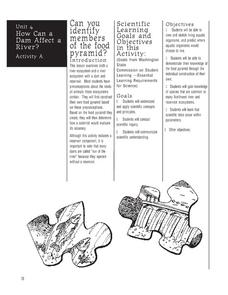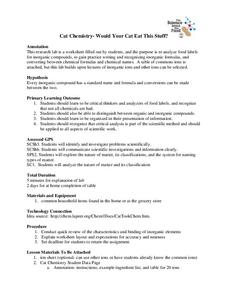Curated OER
Source Search: Agricultural Products
Farmers just farm, right? Find out how important agricultural products are to our modern society. Learners will explore the foods, textiles, and fuels made from industrial farm goods. They'll also explore the idea of choosing an...
Curated OER
Food Packaging
Students identify the functions of packaging food and how the designs work. In this food packaging instructional activity students identify the changes that occur in different types of materials.
Curated OER
How Safe Is Your Cafeteria Food?
Students explore how the school has done during recent food inspections. They write an article that explores the situation. Students create a chart of violations and corrections.
Curated OER
Pet Food Safety A Con
Students use the internet to research pet food safety laws. In groups, they examine what happened during the pet food recall earlier this year and what is being done to improve the situation. They write a news feature story including...
Curated OER
Restaurants and Food
Sometimes it is appropriate to tip and sometimes it's not. Conduct Internet research to learn the foods and customs associated with various cultures.
Curated OER
Good Food Explorers
Students use different food items in order to practice the mathematical concept of shape recognition. At the same time the teacher explains how crops are a source of physical health. They use all five senses to describe each food item...
Curated OER
The Science of Ghana
Students explore the climate and food sources of Ghana. In this lesson on climate students view diagrams of global convection and complete a convection experiment.
Curated OER
Striking a Balance
Students demonstrate understanding of food chain by assuming roles of animals, playing tag, and simulating feeding relationships.
Curated OER
Striking a Balance
Students explore the many different food chains. They participate in a game in which the class is divided into the different parts of the food chain.
Aquarium of the Pacific
Kelp Forest Conservation
There otter be a better way. As a class, groups work together to create a food web based on the organisms in the kelp forest. Budding scientists watch a video on the kelp forest to see how the organisms create a food web and hear about...
NOAA
Animals of the Fire Ice
When the sun's rays can't reach the producers in a food web, where does all the energy come from? Extreme environments call for extreme food sources. Young scientists investigate creatures that appear to get their energy from methane...
DePaul University
Breaking the Food Chain
Throughout history, the growth of big cities has resulted in the destruction of ecosystems. In the case of Chicago, IL, a grassland that was once home to bison, deer, wolves, and foxes quickly became a booming city of over three million...
Foundation for Water & Energy Education
How Can a Dam Affect a River? Activity A
Written for Washington state students in life science, this lesson provides an opportunity to examine the residents of local freshwater habitats. You or the class collects a water sample, and learners try to examine what organisms live...
Curated OER
The Source
Youngsters listen to the teacher read an excerpt from the story, The Source. The goal of the lesson is to have them begin to get an idea of where many foods and fibers come from. The lesson has the teacher stop reading at many points in...
Curated OER
Where Does Food Come From?
Distinguish between food and non-food items. Recognize that food is obtained from both plant and animal sources. Identify sources for some common animal foods then construct a simple food path from the farm to the consumer.
Curated OER
Go To Sleep, Gecko!
Second graders examine the interdependence of organisms using the book "Go To Sleep, Gecko!" They examine a variety of food chains, listen to the book, and answer story comprehension questions. Students then conduct research on food...
Curated OER
What Does Earth Day Mean? - Biology Teaching Thesis
Students possible sources of water pollution, and explain the effects that water pollution can have on the food on the food chain. They Name human and other animal (i.e. fish) illnesses that can be contracted from drinking polluted...
Curated OER
Tastes Great-- Is It Good for You?
Students use the food guide pyramid established by the U.S. Department of Agriculture to evaluate the nutritional value of their favorite foods.
Curated OER
Sippin' on Smoothies
Why is calcium good for the body? Where is it stored? Young chefs discover the importance of calcium and review a list of foods that are rich in the material. They then make delicious smoothies high in calcium! Teaching kids how to make...
University of Georgia
Would Your Cat Eat This Stuff?
Processed foods use inorganic compounds for flavoring and preservation. This take-home laboratory challenges scholars to find 20 different compounds identified on the labels of foods to list on their data collection sheet. The activity...
Curated OER
Filling Up-Gasoline
In this fuel sources worksheet, students calculate the E85 alternative fuel costs per gallon compared to the cost of gasoline. Students complete a table to show the comparison prices. They create a triple line graph to show the...
Curated OER
Create a Walking Tour of San Francisco's Chinatown
Take a tour of Chinatown as it was in the 1800's. Analyzing primary source images and documents, learners will gain a better understanding of the myths and misconceptions of Chinese immigrants during the 1800's. They create a pamphlet to...
Curated OER
Fresh Foods from Farm to Table
Are you a good egg? Learners begin a farm-to-table lesson by acting out verbs in groups to demonstrate the egg production process, and then research the steps using online resources. Several excellent videos are linked through the...
Curated OER
Ethical and Critical Thinking: Genetically Modified Food
Young scholars read statements representing different points of view on Genetically Modified Food. They identify the "facts" and "opinions" in each statement, and then briefly summarize the issue of Genetically Modified Food in a short...






